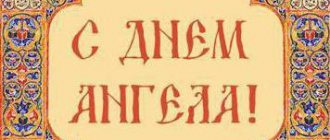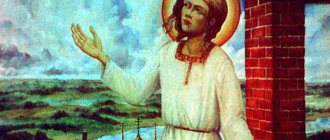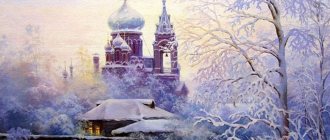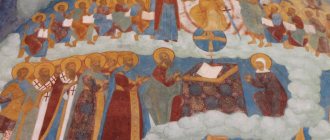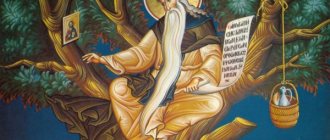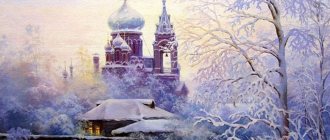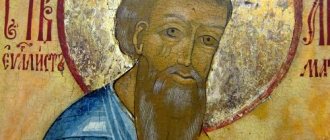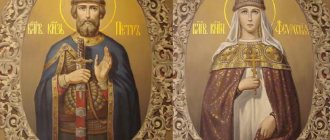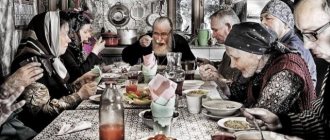January 30 , or more precisely, is not only Anton Predzimnik’s Day, but also Antonina’s Day. People today noted that it seems that winter has already passed the halfway mark, but February is still ahead, which could be much worse than the entire previous period. Therefore, we sincerely rejoiced at the first “hello” of spring - the increase in daylight hours, but did not relax and carefully looked and listened to the signs indicating the weather. So that the sudden onset of frost does not take him by surprise - after all, “Anton is cunning from all sides.”
Memory of Anthony the Great - founder of hermit monasticism
The Monk Anthony, the greatest ascetic, the founder of desert life and the father of monasticism, who received the name Great from the Holy Church, was born in Egypt, in the village of Koma, near the Thebaid desert, in 251. His parents were pious Christians of noble birth. From his youth, Anthony was always serious and focused. He loved to attend church services and listened to the Holy Scriptures with such deep attention that he remembered what he heard for the rest of his life. From his youth he was guided by the commandments of the Lord.
Saint Anthony was about twenty years old when he lost his parents, and he was left with a young sister in his care. While attending church services, the young man was imbued with a reverent feeling for those Christians who, as narrated in the Acts of the Apostles, sold their estates, and laid their price at the feet of the Apostles.
He sold the estate left to him after the death of his parents, distributed the money to the poor, left his sister in the care of pious virgins in the monastery, left his parents' house and, settling not far from his village in a poor hut, began an ascetic life. With the labor of his hands he earned food and alms for the poor. Sometimes the holy youth visited other ascetics who lived in the surrounding area, and tried to receive instruction and benefit from each.
He turned to one of the ascetics for guidance in spiritual life
During this period of his life, the Monk Anthony was subjected to severe temptations from the devil. The enemy of the human race confused the young ascetic with thoughts, doubts about his chosen path, longing for his sister, and tried to persuade Anthony to carnal sin, but the monk kept his firm faith, constantly prayed and intensified his deeds. Anthony prayed that the Lord would show him the way of salvation, and a vision was shown to him. The ascetic saw a man who alternately prayed and began to work - this was an Angel whom the Lord sent to admonish His chosen one. Then the monk established a strict order for his life. He ate food once a day, and sometimes once every two or three days; He spent all his nights in prayer, indulging in a short sleep only on the third or fourth night after continuous vigil.
The life of the famous ascetic, St. Anthony the Great, is described in detail by the Father of the Church, St. Athanasius of Alexandria. This work of Saint Athanasius - the first monument of Orthodox hagiography - is considered one of his best writings; St. John Chrysostom says that this life should be read by all Christians.
Find out more: Ukrainian boxer, a native of Simferopol, Alexander Usik, is being urged not to be allowed into Crimea
The Monk Anthony spent 85 years of his life in desert solitude. Shortly before his death, the monk told the brethren that he would soon be taken from them. Again and again he taught them to preserve the Orthodox faith in purity, to avoid all communication with heretics, and not to weaken in monastic deeds.
Signs and beliefs January 30
- The weather is warm in Anton, but the next day there will be severe frosts.
- If there is a thaw all day on January 30th, expect early spring and a good catch of fish. But there will be practically no precipitation in the spring.
- The sun on January 30 appeared only at noon - we should expect early spring.
- It's snowing - it will be late spring.
- Loud chirping of tits in the morning - expect colder weather.
- If the Moon only occasionally peeks out from the clouds, you can hope for a good grain harvest.
- The month of January 30th has steep horns - the weather will be sunny and frosty.
- Clear sky and moonlit night - there will be little harvest.
- A clear and windless day on January 30 - expect colder temperatures.
By the way, special round koloboks made of oatmeal were baked for Anton and Antonina. It was customary to treat children to them so that summer would come faster. Koloboks are popularly symbolized by the sun! Will you bake it? Will you call for warm days?
Name days are celebrated today by: Antonina, Anton, Georgy, Ivan, Victor, Savely, Pavel, Feodosius.
And January 30th is Frost and Snow Maiden Day! A bright pagan celebration that was celebrated very widely by our ancestors in Ancient Rus'. True, this day does not have any specific celebration traditions, so show your imagination and come up with your own scenario for such a wonderful date! To the delight of both adults and children!
By the way, according to the myths of the ancient Slavs, Frost’s wife is the Snow Queen, who is the daughter of Koshchei and Mara, who rule the dark underground kingdom. And the Snow Maiden, accordingly, is the daughter of Frost and the Snow Queen. And this explanation completely denies the story that the Snow Maiden is the granddaughter of Father Frost. It also negates the statement that these fairy-tale characters were invented relatively recently. Not at all - they are hundreds of years old! There's a lot to celebrate today, isn't there?
Venerable Anthony the Great
Saint Reverend Anthony the Great
Anthony the Great was born in Egypt around 250 from noble and wealthy parents who raised him in the Christian faith. At the age of eighteen, he lost his parents and was left alone with his sister, who was in his care. One day he was going to church and thinking about the holy apostles, how they left everything to follow the Lord. He enters the temple and hears the gospel words: “If you want to be perfect, go, sell what you have and give to the poor, and you will have treasure in Heaven, and follow Me” (Matthew 19:21). These words struck Anthony, as if they were spoken by the Lord personally to him. Soon after this, Anthony renounced the inheritance from his parents in favor of the poor inhabitants of his village, but was perplexed as to whom he would leave his sister to. Concerned with this thought, he enters the temple another time and hears there again the words of the Savior addressed to him: “Do not worry about tomorrow: tomorrow will take care of itself; Sufficient for each day is your own care” (Matthew 6:34). Anthony entrusted his sister to Christian virgins known to him and left the city and home to live in solitude and serve the Lord alone.
The departure of the Monk Anthony from the world did not happen suddenly, but gradually. At first he stayed near the city with a pious elder who lived in solitude and tried to imitate him in everything. He also visited other hermits who lived in the vicinity of the city and took their advice. Already at this time he became so famous for his exploits that he was called “the friend of God.” Then he decides to move on. He calls the old man with him, and when he refuses, he says goodbye to him and settles in one of the remote caves. One of his friends brought him food from time to time. Finally, Saint Anthony leaves completely from inhabited places, crosses the Nile River and settles in the ruins of a military fortification. He brought with him bread for six months, and after that he received it from his friends only twice a year through a hole in the roof.
It is impossible to describe how many temptations and struggles this great ascetic endured. He suffered from hunger and thirst, from cold and heat. But the most terrible temptation of the hermit, according to Anthony himself, is in the heart: this is longing for the world and agitation of thoughts. To all this were added temptations and horrors from demons. Sometimes the holy ascetic became exhausted and was ready to fall into despondency. Then either the Lord Himself appeared or sent an angel to encourage him. “Where have you been, good Jesus? Why didn’t you come to end my suffering first?” - Anthony cried when the Lord, after one severe temptation, appeared to him. “I was here,” the Lord told him, “and I waited until I saw your feat.”
One day, amid a terrible struggle with thoughts, Anthony cried out: “Lord, I want to be saved, but my thoughts won’t let me.” Suddenly he sees someone similar to him sitting and working, then he got up and began to pray, then he sat down to work again. “Do this and you will be saved,” the angel of the Lord told him.
Anthony had already lived twenty years in his solitude, when some of his friends, having learned of his whereabouts, came to settle around him. For a long time they knocked on his door and asked him to come out to them from his voluntary imprisonment; They finally decided to break down the doors when Anthony opened them and went out. They were surprised to find no traces of exhaustion in him, although he subjected himself to the greatest hardships. Heavenly peace reigned in his soul and was reflected on his face. Calm, reserved, equally friendly to everyone, the elder soon became the father and mentor of many. The desert came to life: in the mountains all around there appeared abodes of monks; many people sang, read, fasted, prayed, worked, and served the poor. Saint Anthony did not give his disciples any specific rules for monastic life. He cared only about instilling in them a pious mood, instilling in them devotion to the will of God, prayer, renunciation from everything earthly, and tireless work.
But Saint Anthony, in the desert itself, was burdened by the crowds and sought new solitude. “Where do you want to run?” - there was a voice from the sky when he was waiting on the banks of the Nile for a boat to get away from people. “To the upper Thebaid,” answered Anthony. But the same voice objected to him: “Whether you sail up to Thebaid, or down to Bucolia, you will have no peace either there or here. Go to the inner desert.” This was the name of the desert that lay near the shores of the Red Sea. Anthony went there, following the passing Saracens.
After three days of travel, he found a wild, high mountain with a spring of water and a few palm trees in the valley. He settled on this mountain. Here he cultivated a small field, so that now no one needed to come to him and bring bread. From time to time he visited the brethren. The camel carried bread and water to maintain his strength during these difficult journeys through the desert. However, admirers of Saint Anthony also discovered his last solitude. Those who sought his prayers and instructions began to come to him in large numbers. They brought the sick to him; he prayed for them and healed them.
Saint Anthony had lived in the desert for about seventy years. Against his will, the proud thought that he was older than everyone here began to confuse him. He asked God to remove this thought from him and received a revelation that one hermit had settled in the desert much earlier than him and was serving the Lord more than him. Anthony got up early in the morning and went to look for this ascetic unknown to the world. I walked the whole day and did not meet anyone except desert animals. An immense space spread out before him, but he did not lose his hope. Early in the morning he went again. A she-wolf flashed before his eyes, running towards the stream. Saint Anthony approached this stream and saw a cave near it. At the sound of his footsteps, the door to the cave closed tightly. Until noon, Saint Anthony called out through the door to the unknown ascetic and asked to show him his face. Finally, the door opened and a very old man, completely white with gray hair, came out to meet him. It was Saint Paul of Thebes. He had already lived in the desert for about ninety years.
After the brotherly kiss, Paul asked Anthony: “What is the condition of the human race? What kind of government is there in the world? Are there still idolaters left?” The end of persecution and the triumph of Christianity in the Roman Empire was good news for him, but the emergence of Arianism was bitter news. While the elders were talking, a raven came down to them and laid down some bread. “The Lord is generous and merciful,” Paul exclaimed. “This is how many years I have received half a loaf of bread from Him every day, but now for the sake of your coming He has sent a whole loaf of bread.”
The next morning, Paul revealed himself to Anthony that he would soon depart from the world; therefore, he asked Anthony to bring to him the mantle of Bishop Athanasius in order to cover his remains with it. Anthony hastened to fulfill the desire of the holy elder. He returned to his desert in great excitement and to the questions of his brother monks he could only say: “Sinner, I still considered myself a monk! I saw Elijah, I saw John, I saw Paul in heaven.” On the way back to Saint Paul, he saw him ascending to heaven among a host of angels, prophets and apostles.
“Why, Pavel, didn’t you wait for me? - Anthony exclaimed. “I recognized you so late and you are leaving so early!” However, when he entered Paul's cave, he found him silent and motionless on his knees. Anthony also knelt down and began to pray. After several hours of prayer, he was convinced that Paul was not moving because he was dead. He reverently washed his body and wrapped him in the mantle of St. Athanasius. Suddenly two lions appeared and with their claws dug a rather deep grave, where Anthony buried the holy ascetic.
The Monk Anthony died at a very old age (106 years old, in 356) and for his exploits earned the title of the Great.
The Monk Anthony founded hermit monasticism. Several hermits, under the guidance of one mentor - Abba, lived separately from each other in huts or caves (monasteries) and indulged in prayer, fasting and labor. Several monasteries united under the authority of one abba were called a monastery. But even during the life of Anthony the Great, another kind of monastic life appeared. The ascetics gathered in one community, carried out joint labors, each according to their strength and abilities, shared a common meal, and obeyed the same rules. Such communities were called cenovia or monasteries. The abbas of these communities began to be called archimandrites. The Monk Pachomius the Great is revered as the founder of cenobitic monasticism.
Troparion to St. Anthony the Great
,
voice 4
Imitating the zealot Elijah's morals, following the Baptist's right paths, Father Anthony, you were a desert dweller, and you established the universe with your prayers. Likewise, pray to Christ God for the salvation of our souls.
And on January 30th they celebrate:
- Father Frost and Snow Maiden Day
- World Princess Anastasia Day
- Festival of red arrows pointing south
- Memorial Day of St. Anthony the Great
- School Day of Non-violence and Peace
- National Croissant Day - USA
- Celebration of Education and Enlightenment - Greece
- Independence Day - India
- Holiday of Customs Service Workers - Azerbaijan
- Day of the Military Social Management Specialist of the Armed Forces – Ukraine
- Saudadi Festival - Brazil
- Name days for Anton, Pavel, Ivan, Victor, George, Antonina
- Anton Perezimnik
Urgent messages – in the Telegram channel . Subscribe!
Comments for the site
Cackl e
Orthodox Life
On January 30, the Church remembers the founder of hermit monasticism, St. Anthony the Great. In this regard, we decided to talk with Metropolitan Anthony (Pakanich) about modern monasticism and the ways of its development.
It is known that the Monk Anthony completely withdrew from inhabited places and lived in solitude for 20 years. The ascetic suffered from hunger and thirst, from cold and heat, from many temptations in his solitude. But the most terrible temptation of the hermit, according to Anthony himself, is in the heart: this is longing for the world and agitation of thoughts.
– Vladyka, what is the most terrible temptation of a modern monk, in your opinion?
– Since the fall of our ancestors, when the lust of the flesh, the lust of desire and the pride of life entered the world, the enemy of the human race continues to act with the help of these very levers. If we open the patristic heritage, we will see that the methods of spiritual warfare of the ascetics of antiquity remain relevant in our time. After all, the main task of the devil is to tear a person away from God. Therefore, the most dangerous temptation for every Christian at all times remains unchanged - the loss of a living connection with the Lord. It is no coincidence that the Venerable Paisius the Svyatogorets says that “monks are radio operators of the Mother Church, and, therefore, if they go far from the world, then they do it out of love, for they leave the “radio interference” of the world in order to have a better connection and more and better help the world."
– The content of the life of monks has always been considered tireless prayer, thinking about God, the feat of self-denial and work. How have the tasks and content of monastic life changed in today's realities?
– Monasticism is the response of a God-loving soul to the call of the Lord to leave everything and follow Him (Matthew 19:16–26). And as Dostoevsky’s wonderful character Alyosha Karamazov said, it is impossible to give two rubles for a donation instead of “everything”, and instead of “follow me”, go only to mass once a week.
Monasticism, by its design, is an imitation of the way of life of our Lord Jesus Christ. The Gospel Christ reveals itself to us as the ideal of a perfect monk: He is unmarried, free from family attachments, has no roof over his head, wanders, lives in voluntary poverty, fasts, and spends his nights in prayer. Monasticism is the desire to get as close as possible to this ideal. And since “Jesus Christ is the same yesterday and today and forever” (Heb. 13:8), then the content of monastic life will remain unchanged. As St. Ignatius (Brianchaninov) teaches, “monastic life is nothing more than life according to the Gospel commandments, wherever it is lived - in a crowded environment or in the deepest desert.”
– According to Byzantine tradition, anyone who reached the age of ten could become a monk. For a married person to enter into monasticism, the consent of the second spouse was required. What are the conditions for entering monasticism today? Who can become a monk?
– In ancient monasteries they took a very long time to prepare for tonsure. Before entering the monastery, a person was in the status of a novice and thought for a long time about his choice. And only if a person, after spending many years in a monastery, understood that this was his path, he was tonsured. Thus, tonsure was not the beginning of his monastic path, but a kind of result of many years of experience.
Every Orthodox Christian who has felt a calling to monastic life and has no family obligations in the world can undoubtedly come to a monastery and try his hand as a laborer or novice. The Lord will show you the further path.
Monasticism, unlike marriage, is the lot of the elect - the elect not in the sense that they are better than others, but in the sense that they feel a calling and a taste for solitude. If a person has no need to be alone, if he is bored alone with himself and with God, if he constantly needs something external to fill, if he does not like prayer, is not able to dissolve in the element of prayer, go deeper into it, get closer through prayer to God - in this case he should not take monasticism. “If you want eternal salvation to be your main concern, be in this world as a wanderer and stranger,” writes Saint Tikhon of Zadonsk.
– When entering a monastery, a person receives a new name. Why?
– A person, taking monastic vows, dies to his former, worldly life, and in connection with this he is given a new name, because a Christian begins a new life in the spiritual sense.
– In the Middle Ages, monasteries were the most important centers of culture; first of all, they were centers of writing. In those distant times, against the backdrop of almost universal illiteracy, the monks were distinguished by their education and reading. This was explained by the fact that according to the Rule, a monk had to spend most of his free time reading religious books. Therefore, the first libraries appeared in monasteries. What is the place of monasteries in the modern world? What is their value for modern society?
– Saint John Chrysostom said that “monasteries are a quiet haven; they are like torches that shine on people coming from afar, attracting everyone to their silence.” In addition to divine services, life in the monastery also includes social, charitable, missionary, catechetical activities, and the implementation of Orthodox outreach projects. Currently, almost every monastery has a parochial school, electronic resources, and possibly a printing house. From history we know that even in troubled periods, during famines, epidemics, and disasters, monasteries remained islands of salvation for many suffering people. The monasteries at all times healed both souls and bodies, and were the religious, educational, social and economic support of our people. In our time, monasteries remain centers of spiritual enlightenment, lamps of Orthodox faith and piety, a quiet haven for many souls seeking Christ's consolation.
– What is the most important thing for a modern monk, based on your many years of experience?
– The ancient ascetics of the faith left the world not out of fear of not being saved, but because of the unattractiveness of the world. They went to the desert not as to a dark and damp grave, but as to a blooming and joyful land of the spirit. The Venerable Diadochos of Photikie, back in the 5th century, formulated the general rule for leaving the world: “We voluntarily renounce the sweets of this life only when we taste the sweetness of God in a holistic sense of completeness.” Therefore, the most important thing for us is to acquire and preserve the fullness of grace, in which an amazing peace of heart and joy in the Holy Spirit are revealed to a person.
“True life is God's grace. Earthly life, with its constant fluidity and temporariness, is a strange synthesis of life and death, it is half-life, writes Archimandrite Raphael (Karelin). – The light that a monk has acquired in his heart transforms the whole world. He breathes life into it, one might even say that this light resuscitates dying humanity, it resists the destructive, centrifugal force of sin, and if it weren’t for the prayer books for the world, if it weren’t for the bearers of spiritual light, then perhaps the world would have already become obsolete "
The victory over evil that a person wins in his own heart makes a colossal contribution to the salvation of the whole world. The Fathers of the Church understood that the renewal of the world and the happiness of people depend not on external circumstances, but on internal activity. True renewal of life is possible only in the spirit. Monks do not strive to improve the world, but to transform themselves, so that the world is transformed from the inside. As St. Seraphim of Sarov said: “Acquire a peaceful spirit, and thousands around you will be saved.”
Interviewed by Natalya Goroshkova
